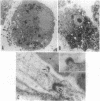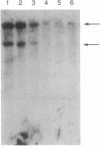Abstract
A retroviral construct encoding polyoma middle-sized T antigen was used to generate transformed endothelial cell lines from heart (H5V), brain (B9V), and whole-embryo (E10V) of C57BL/6 mice. When injected into syngeneic recipients, H5V and the less studied B9V and E10V cells caused vascular tumors which, depending on the number of cells inoculated, regressed or progressed, leading to death of the host. When H5V cells were injected into immunodeficient mice, tumors were observed with inocula which did not form lesions in immunocompetent recipients and regression did not occur. Treatment with anti-LFA-1, anti-Thy-1.2, and anti-CD8 antibodies abolished rejection; anti-CD4 was a somewhat less effective inhibitor of resistance. Animals with progressive tumors exhibited secondary lesions in various organs with prominent skin involvement in nude mice. Histologically, the tumors had the appearance of a hemangioma, with areas resembling Kaposi sarcoma. Cells lining vascular lacunae had the morphological features of injected H5V cells. The lesions were characterized by prominent neovascularization and mononuclear cell infiltration. Southern blot hybridization analysis revealed that approximately 5% of the cells in the tumor mass were transplanted H5V cells. Thus, the H5V transformed endothelial line causes vascular lesions that are sustained to a large extent by recruitment of host cells and manifests full malignant behavior only in immunocompromised hosts. The hypothesis of a tumor sustained by a minute proportion of transformed cells, which recruit host elements and express full malignant behavior only in immunodeficient hosts, would account for several features of some vascular neoplasms in man.
Full text
PDF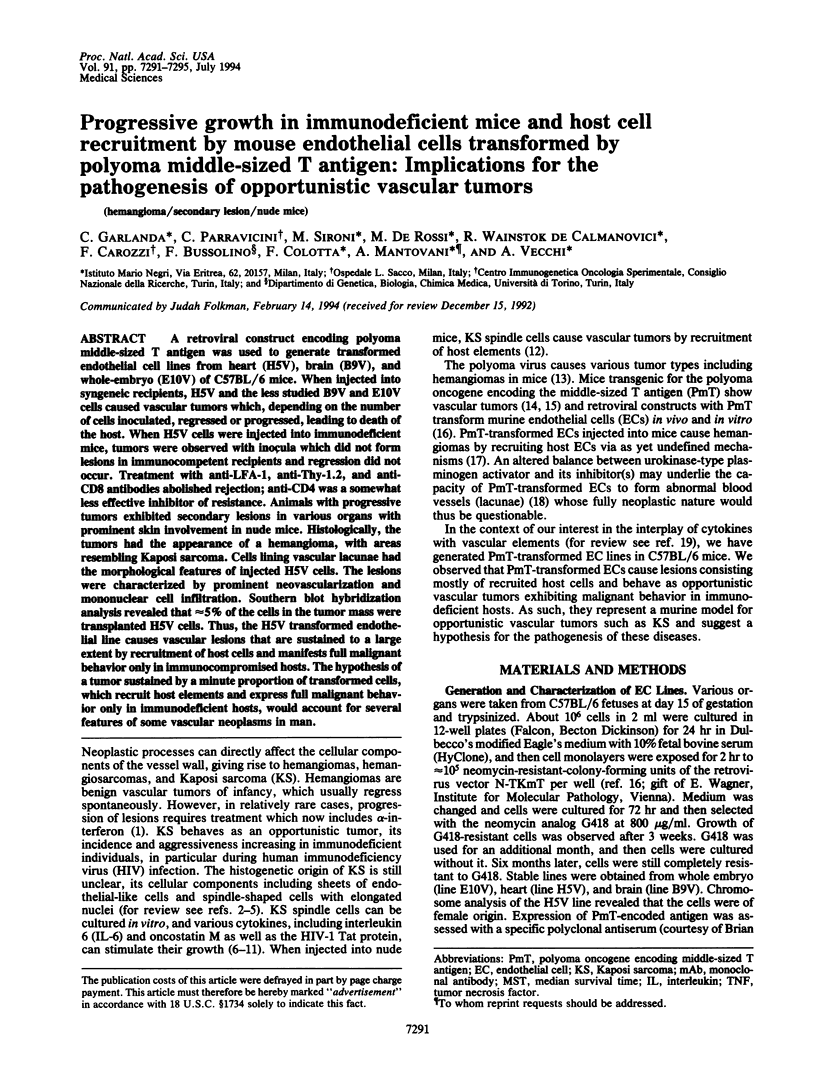
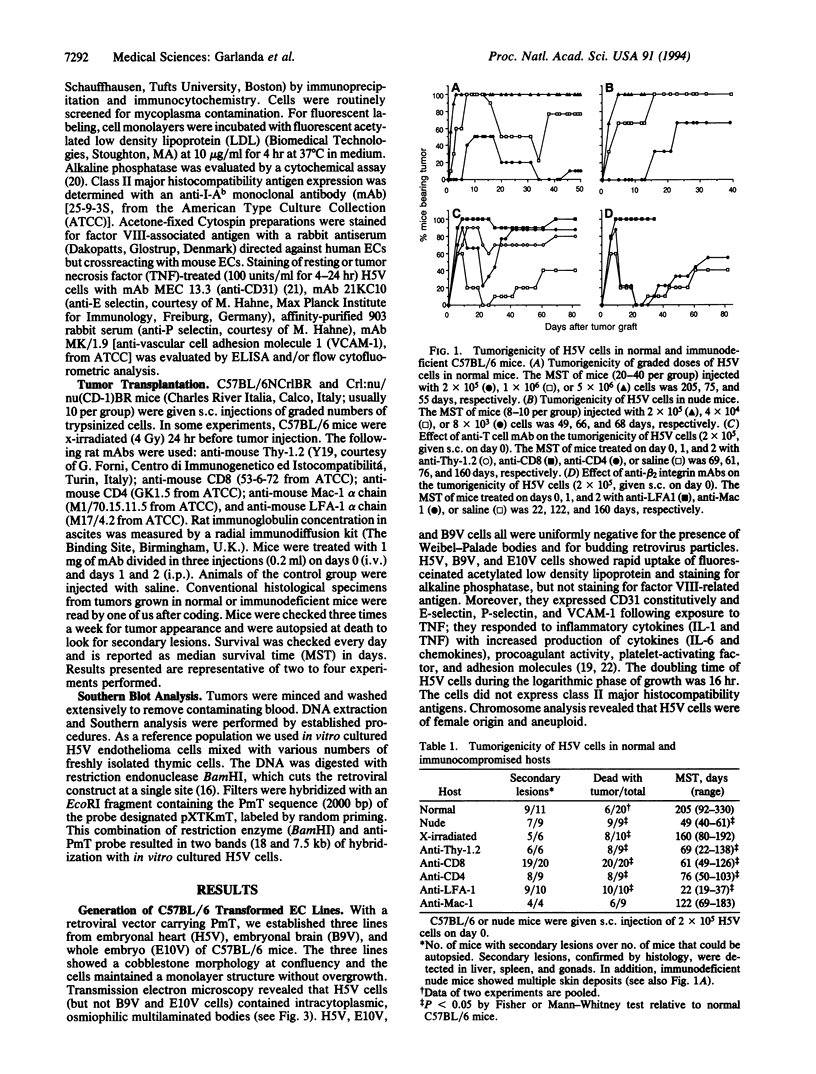
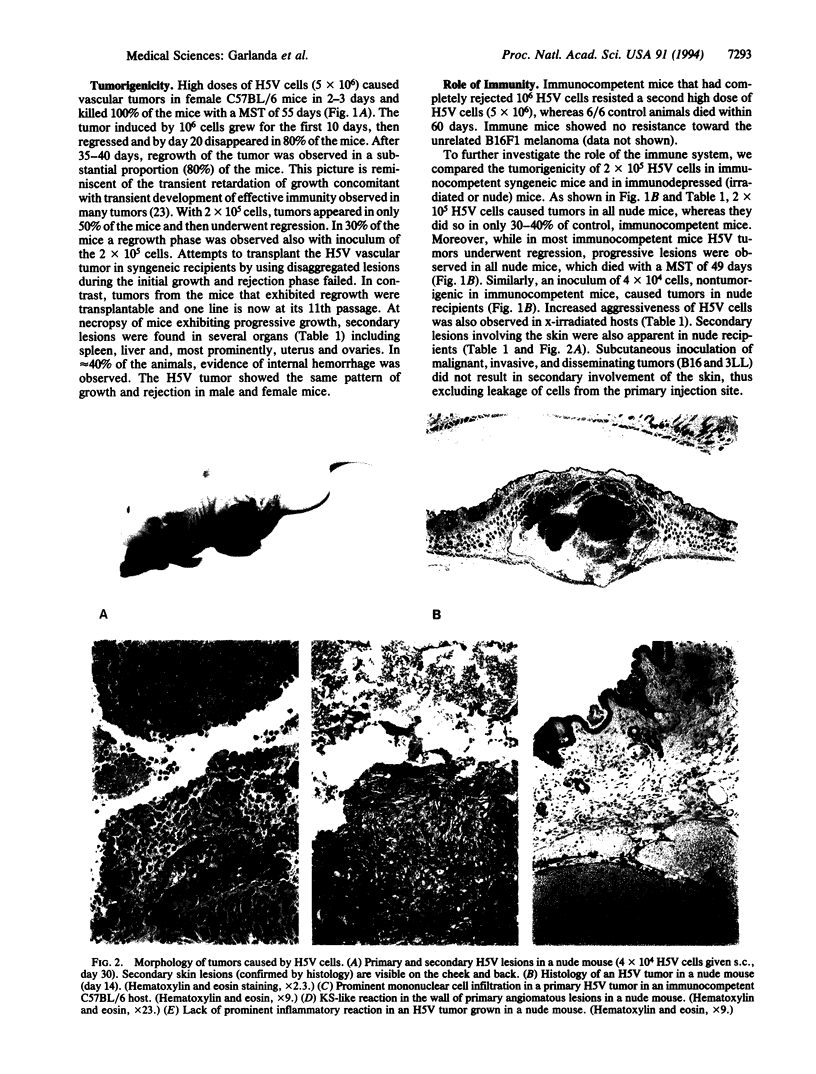
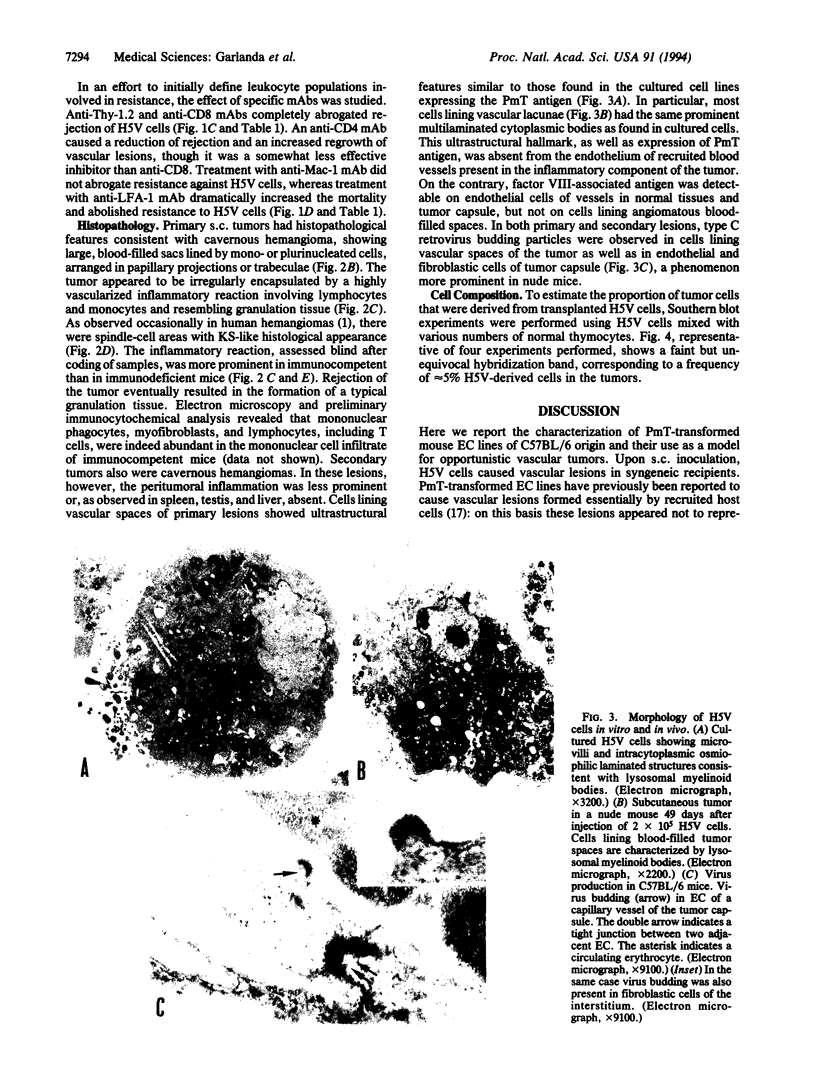

Images in this article
Selected References
These references are in PubMed. This may not be the complete list of references from this article.
- Armes J. A review of Kaposi's sarcoma. Adv Cancer Res. 1989;53:73–87. doi: 10.1016/s0065-230x(08)60279-1. [DOI] [PubMed] [Google Scholar]
- Bautch V. L., Toda S., Hassell J. A., Hanahan D. Endothelial cell tumors develop in transgenic mice carrying polyoma virus middle T oncogene. Cell. 1987 Nov 20;51(4):529–537. doi: 10.1016/0092-8674(87)90122-x. [DOI] [PubMed] [Google Scholar]
- Bussolino F., De Rossi M., Sica A., Colotta F., Wang J. M., Bocchietto E., Padura I. M., Bosia A., DeJana E., Mantovani A. Murine endothelioma cell lines transformed by polyoma middle T oncogene as target for and producers of cytokines. J Immunol. 1991 Oct 1;147(7):2122–2129. [PubMed] [Google Scholar]
- DiGiacomo A., North R. J. T cell suppressors of antitumor immunity. The production of Ly-1-,2+ suppressors of delayed sensitivity precedes the production of suppressors of protective immunity. J Exp Med. 1986 Oct 1;164(4):1179–1192. doi: 10.1084/jem.164.4.1179. [DOI] [PMC free article] [PubMed] [Google Scholar]
- Dubois N. A., Kolpack L. C., Wang R., Azizkhan R. G., Bautch V. L. Isolation and characterization of an established endothelial cell line from transgenic mouse hemangiomas. Exp Cell Res. 1991 Oct;196(2):302–313. doi: 10.1016/0014-4827(91)90265-v. [DOI] [PubMed] [Google Scholar]
- Ensoli B., Barillari G., Salahuddin S. Z., Gallo R. C., Wong-Staal F. Tat protein of HIV-1 stimulates growth of cells derived from Kaposi's sarcoma lesions of AIDS patients. Nature. 1990 May 3;345(6270):84–86. doi: 10.1038/345084a0. [DOI] [PubMed] [Google Scholar]
- Ensoli B., Nakamura S., Salahuddin S. Z., Biberfeld P., Larsson L., Beaver B., Wong-Staal F., Gallo R. C. AIDS-Kaposi's sarcoma-derived cells express cytokines with autocrine and paracrine growth effects. Science. 1989 Jan 13;243(4888):223–226. doi: 10.1126/science.2643161. [DOI] [PubMed] [Google Scholar]
- Ezekowitz R. A., Mulliken J. B., Folkman J. Interferon alfa-2a therapy for life-threatening hemangiomas of infancy. N Engl J Med. 1992 May 28;326(22):1456–1463. doi: 10.1056/NEJM199205283262203. [DOI] [PubMed] [Google Scholar]
- Mantovani A., Bussolino F., Dejana E. Cytokine regulation of endothelial cell function. FASEB J. 1992 May;6(8):2591–2599. doi: 10.1096/fasebj.6.8.1592209. [DOI] [PubMed] [Google Scholar]
- Miles S. A., Martínez-Maza O., Rezai A., Magpantay L., Kishimoto T., Nakamura S., Radka S. F., Linsley P. S. Oncostatin M as a potent mitogen for AIDS-Kaposi's sarcoma-derived cells. Science. 1992 Mar 13;255(5050):1432–1434. doi: 10.1126/science.1542793. [DOI] [PubMed] [Google Scholar]
- Miles S. A., Rezai A. R., Salazar-González J. F., Vander Meyden M., Stevens R. H., Logan D. M., Mitsuyasu R. T., Taga T., Hirano T., Kishimoto T. AIDS Kaposi sarcoma-derived cells produce and respond to interleukin 6. Proc Natl Acad Sci U S A. 1990 Jun;87(11):4068–4072. doi: 10.1073/pnas.87.11.4068. [DOI] [PMC free article] [PubMed] [Google Scholar]
- Montesano R., Pepper M. S., Möhle-Steinlein U., Risau W., Wagner E. F., Orci L. Increased proteolytic activity is responsible for the aberrant morphogenetic behavior of endothelial cells expressing the middle T oncogene. Cell. 1990 Aug 10;62(3):435–445. doi: 10.1016/0092-8674(90)90009-4. [DOI] [PubMed] [Google Scholar]
- Nair B. C., DeVico A. L., Nakamura S., Copeland T. D., Chen Y., Patel A., O'Neil T., Oroszlan S., Gallo R. C., Sarngadharan M. G. Identification of a major growth factor for AIDS-Kaposi's sarcoma cells as oncostatin M. Science. 1992 Mar 13;255(5050):1430–1432. doi: 10.1126/science.1542792. [DOI] [PubMed] [Google Scholar]
- Nakamura S., Salahuddin S. Z., Biberfeld P., Ensoli B., Markham P. D., Wong-Staal F., Gallo R. C. Kaposi's sarcoma cells: long-term culture with growth factor from retrovirus-infected CD4+ T cells. Science. 1988 Oct 21;242(4877):426–430. doi: 10.1126/science.3262925. [DOI] [PubMed] [Google Scholar]
- Rambaldi A., Terao M., Bettoni S., Bassan R., Battista R., Barbui T., Garattini E. Differences in the expression of alkaline phosphatase mRNA in chronic myelogenous leukemia and paroxysmal nocturnal hemoglobinuria polymorphonuclear leukocytes. Blood. 1989 Apr;73(5):1113–1115. [PubMed] [Google Scholar]
- Salahuddin S. Z., Nakamura S., Biberfeld P., Kaplan M. H., Markham P. D., Larsson L., Gallo R. C. Angiogenic properties of Kaposi's sarcoma-derived cells after long-term culture in vitro. Science. 1988 Oct 21;242(4877):430–433. doi: 10.1126/science.2459779. [DOI] [PubMed] [Google Scholar]
- Taraboletti G., Belotti D., Dejana E., Mantovani A., Giavazzi R. Endothelial cell migration and invasiveness are induced by a soluble factor produced by murine endothelioma cells transformed by polyoma virus middle T oncogene. Cancer Res. 1993 Aug 15;53(16):3812–3816. [PubMed] [Google Scholar]
- Vecchi A., Garlanda C., Lampugnani M. G., Resnati M., Matteucci C., Stoppacciaro A., Schnurch H., Risau W., Ruco L., Mantovani A. Monoclonal antibodies specific for endothelial cells of mouse blood vessels. Their application in the identification of adult and embryonic endothelium. Eur J Cell Biol. 1994 Apr;63(2):247–254. [PubMed] [Google Scholar]
- Weiss R. A. The conundrum of Kaposi's sarcoma. Eur J Cancer. 1990;26(6):657–659. doi: 10.1016/0277-5379(90)90109-7. [DOI] [PubMed] [Google Scholar]
- Williams R. L., Courtneidge S. A., Wagner E. F. Embryonic lethalities and endothelial tumors in chimeric mice expressing polyoma virus middle T oncogene. Cell. 1988 Jan 15;52(1):121–131. doi: 10.1016/0092-8674(88)90536-3. [DOI] [PubMed] [Google Scholar]
- Williams R. L., Risau W., Zerwes H. G., Drexler H., Aguzzi A., Wagner E. F. Endothelioma cells expressing the polyoma middle T oncogene induce hemangiomas by host cell recruitment. Cell. 1989 Jun 16;57(6):1053–1063. doi: 10.1016/0092-8674(89)90343-7. [DOI] [PubMed] [Google Scholar]





